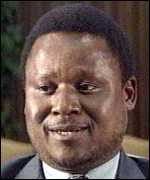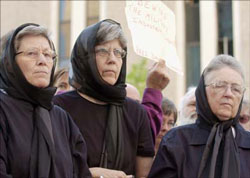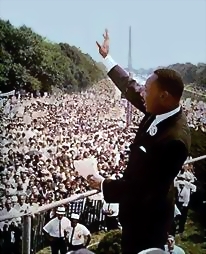Sent for Peace:
Holocaust Memorial Day
For Sunday April 11, 2010
Lectionary Readings (Revised Common Lectionary, Year C)
Acts 5:27–32
Psalm 118:14–29 or Psalm 150
Revelation 1:4–8
John 20:19–31
This Sunday April 11 the world commemorates Holocaust Memorial Day. It's a day when we honor the memory of the six million Jews who were systematically exterminated by the Nazis in 35 countries, and with them an additional three to four million people whom the Nazis deemed undesirable and inferior "enemies of the state" — gays, gypsies, Jehovah's Witnesses, Soviet prisoners of war, Slavic people, the physically and mentally disabled, and political dissidents of every sort.
Yom HaShoah is also a day to remember other mass murders of the last hundred years — a million or more Armenians under the Turks (and 800,000 more exported); two million Cambodians under the Khmer Rouge and Pol Pot; Kurds under Saddam Hussein; Muslims, Croats, and ethnic Albanians under the Serbs; thirty million Chinese under Mao; nearly a million ethnic Tutsis and moderate Hutus by extremist Hutus in Rwanda; and in Darfur the Fur, Zaghawa, and Massaleit peoples by the Janjaweed (literally, "devils on horseback") supported by Sudan's government.
 |
Frank Chikane. |
The most under-reported slaughter has taken place in the Democratic Republic of Congo (former Zaire) and involving at least nine other African nations. According to the International Rescue Committee (January 2008), "conflict and humanitarian crisis in the Democratic Republic of Congo have taken the lives of an estimated 5.4 million people since 1998 and continue to leave as many as 45,000 dead every month." With a population of about 50 million Congolese from 200 different ethnic groups, that's 10% of the population. A comparative figure for the United States would be 30 million deaths.
I've learned two new words in my reading the last few months: "eliminationism" and "gendercide."
In Worse Than War; Genocide, Eliminationism, and the Ongoing Assault on Humanity ( 2009), Daniel Goldhagen describes how 127–175 million people have been "eliminated" in the last century. These people came from all regions of the world, and from all social, economic and political groups. The vast majority of them were killed in their own countries, by their fellow citizens, by willing and non-coerced murderers, and almost never with any substantial dissent. By Goldhagen's count, "mass murder has deeply scarred countries home to 4.4 billion people, two-thirds of the world's population" (273). Civilian deaths and injuries outnumber military ones by a factor of nine to one (573). Eliminationism is thus "worse than war."
In a cover story on "gendercide" The Economist (March 6–12, 2010) asked, "what happened to 100 million baby girls?" This staggering death toll was first reported in a 1990 study by the economist Amartya Sen. In Half the Sky (2009), Nicholas Kristof and Sheryl WuDunn explore the many versions of violent oppression against women and girls — sex trafficking and forced prostitution; gender based violence, including honor killings and mass rape; and maternal mortality. Parts of their book make for painful reading, with graphic accounts of bride burning, female genital mutilation, sexual selective abortions, foot binding, female infanticide, and interviews with teenage girls who work as prostitutes seven days a week, fifteen hours a day. Gendercide might be the leading human rights issue of our day.
After the chaos and violence of Holy Week, John describes how the followers of Jesus huddled in fear behind locked doors. Jesus then appeared among them and said: "Peace be with you. As the Father has sent me, I am sending you." The followers of Jesus were commissioned to proclaim God's peace to all the world, to remind people that the creator of the cosmos wishes human health and wholeness for every person.
 |
Ardeth Platte, Carol Gilbert and Jackie Hudson. |
Making peace, though, will never be easy. This is because Jesus is not only the Prince of Peace. In this week's epistle he is also the "ruler of the kings of the earth" who inaugurated an alternate and deeply subversive reign and rule. In a world of gendercide and eliminations, the interests of the state and those of Jesus clash and collide. And so Jesus was also "the stone the builders rejected" (Psalm 118:22) and a "rock of offense" (1 Peter 2:8 = Isaiah 8:14) for wishing God's peace to every person. Consider the fortunes of his apostles.
John wrote the book of Revelation from political banishment to the rocky island of Patmos in the Aegean Sea (1:9). He excoriates Rome as "Babylon the Great and the mother of prostitutes" (17:5), and as the "city of power" (18:10). John pictures Rome as the stage where the human drama unfolds among "the kings of the earth, the princes, the generals, the rich, the mighty, and every slave and every free man" (6:15). And in another reading for this week, Peter and the apostles were jailed after teaching and preaching the peace of Jesus, insisting "we must obey God rather than men!" (Acts 5:29).
Consider the implications of these two lectionary texts, that "we must obey God rather than men" (Acts 5:29), and that Jesus is "the ruler of the kings of the earth" (Revelation 1:5). If Jesus is King and Lord over all earthly rulers, then the Roman caesar was decidedly not lord, despite its claim that the Roman state was divine and its cult of imperial worship. Christians should never confuse the relative claim to "render to Caesar what is Caesar's" with the absolute and unconditional claim to "render to God what is God's" (Matthew 22:21).
Christians have mimicked caesar and slaughtered people. But not everyone; many other believers have preached peace to all the world.
In 1934 the Barmen Declaration repudiated the nationalism and anti-Semitism of the "German Christian movement" and its appeal to the Bible to support the Nazis: "We reject the false doctrine that beyond its special [ie, limited] commission the State should and could become the sole and total order of human life and so fulfil the vocation of the Church as well." Capitulating to the Nazi status quo was unacceptable to Germany's "Confessing Church."
At the instigation of Frank Chikane, a black pentecostal pastor, in 1985 more than 150 clergy from 20 denominations drafted the Kairos Document to protest South African apartheid. It disavowed "state theology" that is "simply the theological justification of the status quo with its racism, capitalism and totalitarianism. It blesses injustice, canonizes the will of the powerful and reduces the poor to passivity, obedience and apathy." It also critiqued so-called "church theology" which in a "limited, guarded and cautious way" was only superficially critical of apartheid.
 |
Martin Luther King, Jr. |
In July 2003, the Dominican nuns Ardeth Platte, Carol Gilbert and Jackie Hudson, members of a peace community in Baltimore called Jonah House that was founded by the dissident priest Daniel Berrigan, were sentenced to 34 months each in federal prison for sabotaging the national defense and damaging government property. They had protested nuclear weapons by smearing a cross on a Minuteman silo with their own blood and pounding on it with hammers.
By following in the footsteps of the radical peace activist Berrigan, a man who was once on the FBI's Ten Most Wanted list, Platte, Gilbert, and Hudson could have guessed their fate. It was Berrigan, after all, who was once asked how many times he had been jailed for the gospel of peace, to which he responded, "Not enough."
For further reflection:
Saint Francis of Assisi (1182–1226)
The Peace Prayer of Saint Francis
Lord, make me an instrument of your peace.
Where there is hatred, let me sow love;
Where there is error, truth;
Where there is injury, pardon;
Where there is doubt, faith;
Where there is despair, hope;
Where there is darkness, light;
And where there is sadness, joy.
O Divine Master, grant that I may not so much seek
To be consoled as to console;
To be understood as to understand;
To be loved as to love.
For it is in giving that we receive;
It is in pardoning that we are pardoned;
It is in self-forgetting that we find;
And it is in dying to ourselves that we are born to eternal life.
Amen.
We do not know the author of this classic prayer, and it was not until the 1920s that it was even ascribed to Saint Francis. By one account the prayer was found in 1915 in Normandy, written on the back of a card of Saint Francis. But it certainly emulates his longing to be an instrument of peace, reconciliation and redemption in our fallen world.
Image credits: (1) BBC News; (2) ColoradoPeace.org; and (3) NostalgiaCentral.com.





